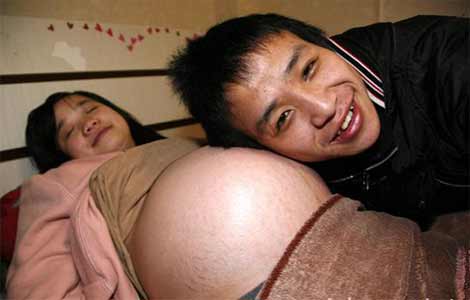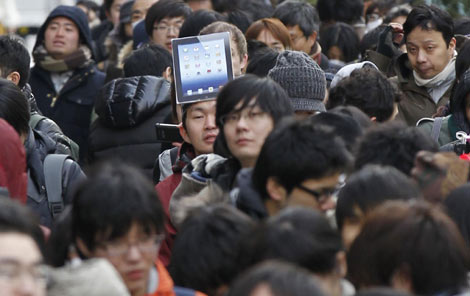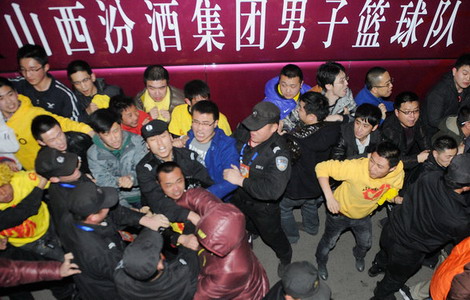 |
|
|
|
|||||||||
3. Developing social services and promoting balanced economic and social development
Governments at all levels increased spending on science and technology, education, culture, health, and sports programs, with the total amount reaching 2.82 trillion yuan.
We continued to enhance China's scientific and technological innovation capabilities. We strengthened basic research and research in cutting-edge technologies. We carried out major national research and development projects, made breakthroughs in a number of core and key technologies, and filled in many gaps in important products and technologies. The Tiangong-1 space module and the Shenzhou-8 spacecraft were launched, and Shenzhou-8 successfully docked with Tiangong-1, marking a new milestone in China's development of manned spaceflights.
We made solid progress in making education more equitable. We thoroughly implemented the Plan for Education Reform and Development. Thanks to tireless efforts over the past 25 years, we have fully attained the goals of making nine-year compulsory education universally available and basically eliminating illiteracy among young and middle-aged adults. Over 30 million rural boarding school students were exempted from accommodation expenses, and 12.28 million of them who are from poor families in the central and western regions received living allowances. A comprehensive system for providing aid to students from poor families was put in place. The children of rural migrant workers were generally granted access to compulsory education in cities where they live. A three-year action plan for preschool education was carried out, and the number of children enrolled in preschool increased. We vigorously developed vocational education. We strengthened training of primary and secondary school teachers, expanded trials of reforming the system of conferring professional titles on them, and raised their overall quality. All the graduates of 2011 who received tuition-free education in teachers' colleges and universities went to teach in primary and secondary schools, with over 90% of them working in central and western China.
We vigorously strengthened development of the cultural sector. The central government increased financial support for cultural programs that benefit the people, and local governments significantly increased spending on nonprofit cultural programs. We increased the number of public cultural facilities open to the public free of charge, and steadily expanded their services. We continued to reform the cultural system, and cultural industries developed rapidly. Major progress was made in protecting cultural relics and in protecting and passing on China's intangible cultural heritage. We put great effort into building public sports facilities, vigorously developed fitness activities across the country, and made new achievements in sports activities.
We actively yet prudently carried out reform and development of medical and healthcare services. We further expanded coverage of basic medical insurance, so that now 1.3 billion urban and rural residents are covered. A medical insurance system that covers the whole population is emerging. We raised the reimbursement rate for hospitalization expenses covered by relevant policies, and expanded the range of major diseases for which medical treatment is insured. Governments at all levels increased per-person subsidies for the medical insurance for non-working urban residents and the new type of rural cooperative medical care system from 120 yuan per year to 200 yuan per year. We implemented the national system for basic drugs in all community-level medical and health care institutions run by the government, and basic drugs became safer and more affordable. We progressed in an orderly fashion with trials of reforming public hospitals, basically established a community medical and health care service system, and made progress in providing equal access to basic public health services.
4. Ensuring and improving the people's wellbeing and solving problems that affect their interests
We continued to put the people's wellbeing first, worked hard to bring the benefit of development to all, and promoted social fairness and justice.
We implemented a more active employment policy. We created jobs through a variety of channels, expanded job opportunities through the creation of new businesses, strengthened vocational skills training, and improved the public employment service system. We increased fiscal, taxation, and financial support to promote employment of university graduates, rural migrant workers, and other key groups. The employment rate for college graduates reached 77.8%, an increase of 1.2 percentage points over the previous year. The number of rural workers totaled 253 million, an increase of 4.4% over the previous year, of whom 159 million worked in towns and cities, up 3.4%.
We adjusted income distribution. We worked hard to increase the income of low-income people. Per capita net income of rural residents in real terms registered the fastest growth since 1985, outpacing urban residents for the second straight year. We significantly increased the minimum wage across the country. Basic pensions for enterprise retirees increased for the seventh consecutive year, with an average increase of 1,680 yuan per person for the year, which benefited over 57 million people. We further increased subsistence allowances for rural and urban residents and subsidies and living allowances for some entitled groups, and granted lump-sum living allowances to more than 86 million people in need, including subsistence allowance recipients in urban and rural areas and childless and infirm rural residents who are entitled to five forms of support (food, clothing, medical care, housing, and burial expenses). We instituted a mechanism to increase social aid and social security benefits when consumer prices rise. The proportion of middle-income earners in the whole population increased. We raised the salary threshold for personal income tax from 2,000 yuan to 3,500 yuan. We reduced the tax burden on over nine million self-employed people. The central government set the new poverty line at 2,300 yuan, which was the per capita net income in rural areas at 2010 prices, an increase of 92% over 2009. This resulted in more low-income people being covered by the government's poverty reduction program, which constitutes tremendous social progress.
We bolstered the development of the social security system. We continued to expand coverage of social security, and the number of people covered by basic old-age insurance for urban residents, unemployment insurance, workers' compensation and maternity insurance rose substantially nationwide. We carried out trials of old-age insurance for non-working urban residents in 2,147 counties and county-level cities and districts, covering 13.34 million residents, and 6.41 million residents received pensions. We launched trials of a new type of old-age insurance for rural residents in 2,343 counties and county-level cities and districts, covering 358 million people, and 98.8 million people received pensions. We extended coverage of this insurance to more than 60% of China's counties. We solved longstanding problems concerning pensions for more than five million retirees of collectively owned enterprises. We included 3.12 million persons who suffer from past work-related injuries and dependents of employees who lost their lives in work-related accidents in workers' compensation insurance. We worked in an orderly way to make it possible to transfer pension accounts between localities. We continued to improve the social security system and made significant progress in extending coverage to all residents. This was an important achievement for ensuring equal access to basic public services for all.
We accelerated the construction of low-income housing. We adopted guidelines on construction and management of low-income housing; improved policies on government input, land supply, credit support, and tax and fee reductions; strove to improve project planning and construction quality; and introduced a system and measures for distributing, managing, and recalling low-income housing. The central government allocated 171.3 billion yuan for these purposes, an increase of 120% over 2010. We basically completed 4.32 million units of low-income urban housing and began construction on a further 10.43 million units.
We worked hard to safeguard public safety. We intensified oversight and supervision of workplace safety and ensured that major accidents were fully investigated and dealt with and those responsible were held accountable. We improved the system and mechanisms for oversight and supervision of food safety, and gave high priority to cracking down on the use of illegal additives and the illegal production and processing of food. We put people and services first, strengthened and made innovations in social administration, strove to investigate and resolve social conflicts, cracked down on crime in accordance with the law, and maintained social harmony and stability.
Wu Ying, iPad, Jeremy Lin, Valentine's Day, Real Name, Whitney Houston, Syria,Iranian issue, Sanyan tourism, Giving birth in Hong Kong, Cadmium spill, housing policy

|

|

|

|

|

|